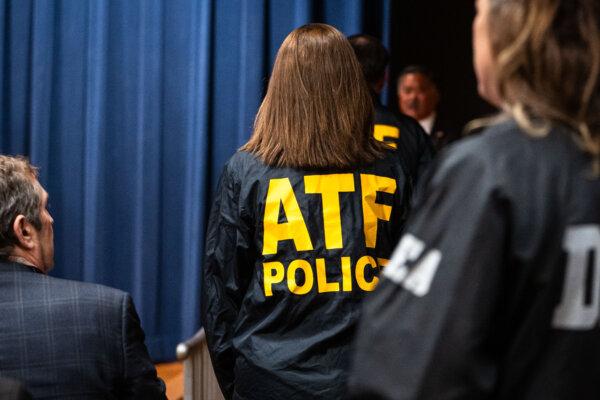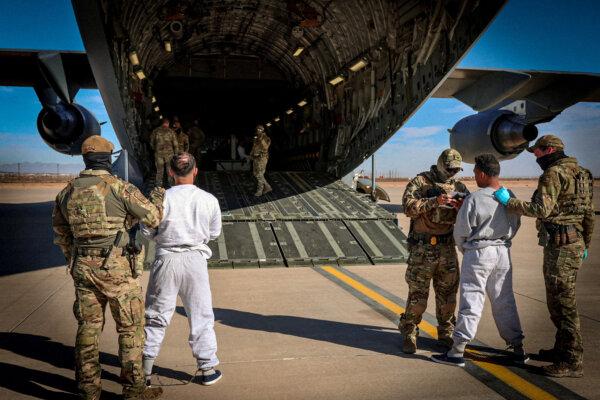The Trump administration’s immigration enforcement has involved not only DHS but the IRS, the military, and the departments of State, Defense and Justice.
The Trump administration’s focus on immigration enforcement has led multiple government agencies, including the Internal Revenue Service (IRS) and the departments of State, Defense, and Justice, as well as the military, to expand their immigration-related activities beyond the Department of Homeland Security (DHS).
Traditional measures have been prioritized by DHS and Customs and Border Protection (CBP) after President Donald Trump’s emergency declaration for the southern border.
The president has also reinstated his “Remain in Mexico” policy from his first administration and restarted work on the border wall. The “catch and release” protocol used by the previous administration was brought to an end, and DHS has revoked previous administration rules that restricted the actions of ICE as it pertained to arresting illegal immigrants at institutions such as schools.
Since implementing the new policy, ICE arrests of criminal illegal immigrants have doubled, and the agency’s arrests of fugitives at large have tripled, according to the DHS.
Daily border encounters have dropped 93 percent since Trump took office, the department said, and the president has made good on his promise to carry out mass deportations, with the administration detaining illegal immigrants, including violent criminals, at Guantanamo Bay.
Military Assistance
The Department of Defense has taken on a key role in border security, which is something that began several administrations ago under President George W. Bush.
Trump outlined his plan for changes to the Department of Defense’s responsibility in a Jan. 20 executive order where he stated that the military has “a long and well-established role in securing our borders against threats of invasion, against unlawful forays by foreign nationals into the United States.”
Under the last Bush administration, active-duty military and National Guard members were sent to the southern border of the United States to assist Border Patrol agents.
Since taking office, Trump has increased the number of troops at the border and promised to send more.
Secretary of Defense Pete Hegseth said that the department’s assets were available to assist in the expulsion of people in the country illegally. Those assets include the use of Guantanamo Bay, which has been the destination of at least 13 immigrant removal flights, loaded with what law enforcement called the “worst of the worst” of the criminal illegal immigrants detained. At least one flight has moved 177 Venezuelan illegal immigrants from Guantanamo Bay, deporting them to Honduras.
ICE has received significant assistance from the United States Air Force in deporting illegal immigrants by air. So far, at least 26 military flights have been used for deportation.
The military’s role has expanded due to the current administration’s designation of criminal cartels and gangs, such as MS-13, as Foreign Terrorist Organizations.
State Department
The Department of State has worked with officials from other nations, smoothing the path to accepting their citizens’ deportation.
Secretary of State Marco Rubio’s first professional international trip was to Central America to broker deals with Guatemala, Panama, and El Salvador regarding illegal immigrants in the United States.
Part of his deal means that those nations will accept not only their citizens but also deportees from other nations that have been less cooperative with the United States’s request.
Some of the higher-ranking officials at the State Department are familiar with the turmoil surrounding the issue of immigration, including Christopher Landau, who is Trump’s choice for Rubio’s deputy. Landau was the U.S. ambassador to Mexico from 2019-2021 and assisted with the first Trump administration’s Remain in Mexico policy.
Homeland Security Secretary Kristi Noem deputized 600 of the State Department’s Diplomatic Security Service members, empowering them to assist with “arresting and deporting” people in the country illegally.

Justice Department
The Department of Justice (DOJ) has taken on sanctuary cities under the leadership of newly appointed Attorney General Pam Bondi.
Bondi has made it clear that cities and states unwilling to work with federal agents on immigration enforcement, including assistance with identification and enforcement of deportation, would still be targeted by the DOJ.
“This is a new DOJ, we are taking steps to protect Americans,” Bondi said while announcing a lawsuit against New York state, the New York attorney general, and the governor over a law that allows people who may not be in the United States legally to obtain driver’s licenses.
Another suit by the U.S. attorney general against the city of Chicago and the state of Illinois challenges their sanctuary laws that, according to the DOJ, obstruct federal immigration enforcement.
Local Law Enforcement
Federal agencies have also leaned heavily on local law enforcement, owing in part to ICE’s 287(g) program. That program allows local law enforcement officers to assist and participate in finding and deporting illegal immigrants.
The program, which was expanded under a Jan. 20 executive order by Trump, requires ICE to delegate immigration enforcement authority to local law enforcement officers and has assisted the federal government in tracking down criminal illegal immigrants.
In January alone, the Monthly 287(g) Encounter Report showed that the local program officers were successful in supporting federal agents in detaining and convicting violent illegal immigrants across multiple states.

More Agencies’ Involvement
The FBI, Drug Enforcement Administration, and Bureau of Alcohol, Tobacco, Firearms and Explosives have all taken part in ICE operations. The Department of Justice’s Bureau of Prisons has worked to detain illegal immigrants, allowing ICE a larger detention capacity.
The Department of Health and Human Services has also suspended a program that was providing legal services to children who entered the country illegally.
The Treasury Department’s Internal Revenue Service has also helped identify employers who have hired illegal immigrants.

Legislative Changes
Congress has enacted changes to support ending illegal immigration. Trump signed legislation passed by both houses of Congress called the Laken Riley Act. The new law requires that federal agencies detain illegal immigrants who are charged with theft, burglary, assaulting law enforcement, or any violent crime.
Temporary Protected Status for Venezuelans, put in place by the Biden administration to allow hundreds of thousands of Venezuelan immigrants to reside in the United States, was also ended in late January.
In his Jan. 20 executive order “Protecting the American People Against Invasion,” the president stated: “Enforcing our Nation’s immigration laws is critically important to the national security and public safety of the United States. The American people deserve a Federal Government that puts their interests first and a Government that understands its sacred obligation to prioritize the safety, security, and financial and economic well-being of Americans.”
The Associated Press contributed to this report.

